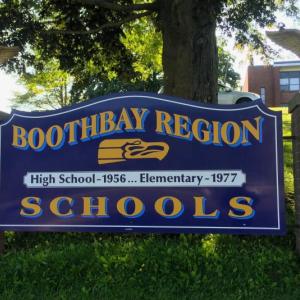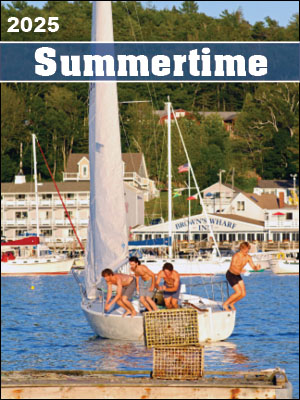CSD trustees send charter changes to legislature
A handful of letters are at the heart of a Community School District (CSD) predicament since April, when the Board of Trustees discovered its budget vote potentially had no impact. Now, concerns about changes to the CSD charter may be easing as trustees proceed with efforts to rectify them. Sept. 25, trustees passed several motions to move new charter language to the state legislature. In addition, a potential explanation for the initial changes has come to light.
In an ongoing discussion, trustees and other elected officials have said the final version of the 2023 CSD Charter differed from what the town reviewed during the approval process. In public forums, the issue has been brought up at trustee, CSD subcommittee, and Boothbay and Boothbay Harbor selectboard meetings.
The issue largely revolves around a line in the third section: “The board of trustees may act as a building and facilities governing committee, including authority in consultation with the district school committee over the budget for maintaining, repairing, replacing and improving the community school district's buildings and other facilities and over the district's capital reserve funds.”
However, according to documents from the district, charter language approved by both school boards and selectboards in 2023 read “The board of trustees shall act as a building and facilities governing committee ...”
That change from “shall” to “may” could have removed much of the trustees' authority, according to the trustees.
At the Sept. 25 meeting, Alternative Organizational Structure (AOS) 98 Superintendent Robert Kahler presented a possible explanation. According to Kahler and CSD records, the language was consistent with what the town and district agreed to when the bill was submitted to the state. However, according to Kahler and the CSD documents, by the time the bill went in front of the legislature, the wording had changed. Kahler said the legislature's Office of the Revisor of Statutes could have made those alterations.
“I can’t believe they could do that,” trustee Ronnie Campbell said, and Kahler said the office could. Kahler added, he could not confirm it, and that the CSD and towns are putting information together, including through Freedom of Information Act requests, to find out more. However, a full investigation could take a considerable amount of time and legal resources.
“I think if we find out it's the reviser who made the mistake, it's amazing for our community,” said trustee Darrell Gudroe. “Everyone can stop thinking it was intentional.”
Reviser of Statutes Edward Charbonneau told the Register that the office did receive language with “shall” and changed it. However, “I think this is a case of intent not matching what was actually written and provided to my office,” he said.
Charbonneau said “shall have the authority to act” is not the same as requiring the board to perform that duty. According to him, it means the board is authorized, similarly to being authorized to drive up a speed limit but not required to.
“Since the structure of the sentence was permissive, ‘may’ was correctly used to designate that permission,” he said. “For that reason, and to conform to Maine drafting standards, the sentence was recast to read: ‘The board of trustees may act as a building and facilities governing committee…’ since that appeared to be the intent of the language provided: providing the board the permission to act, if it wanted to (in other words ‘may’).”
Charbonneau added that no one commented or wrote that the intended role of the board of trustees was to change during the 2023 charter’s public hearing and testimony process.
As part of efforts to address the matter, the board unanimously approved a placeholder bill with charter changes to restore authorities to the trustees. It was sent to Rep. Holly Stover for submission to meet the Sept. 26 cloture deadline.
The largest proposed changes would return the trustees' authority over the district buildings and facilities as well as the budget and capital reserve funds for maintaining, repairing and improving them. As part of that, Kahler said they will insist on “shall.”
“We submitted it that way last time, and it got changed. I want to avoid that (again).” he said.
In addition, the bill would raise the minimum required to initiate a public bond referendum from $250,000 to $2,000,000. According to the trustees, the higher figure coincides with a realistic amount for an emergency repair, based on the cost of the 2023 flood at the elementary school. However, the jump raised concerns.
Tom Perkins, speaking as a Boothbay Harbor resident, said he thought the increase would be too high, even to pass the bill. “I think everybody wants to correct the mistake and give the trustees as much power back as possible, but I don't want two million to hold it back.”
Kahler and trustee chair Sewall Maddocks confirmed the bill is a placeholder and can be changed as it goes through the legislative process. The board generally agreed it did not want the amount to hold the bill back or keep it from getting passed.
Trustees also gave their attorneys the authority to draft changes as approved by the board and to communicate as necessary with the School Committee and town attorneys while changes are being negotiated. Kahler said all four CSD and town selectboards will need to approve the language before the bill is finalized.


































